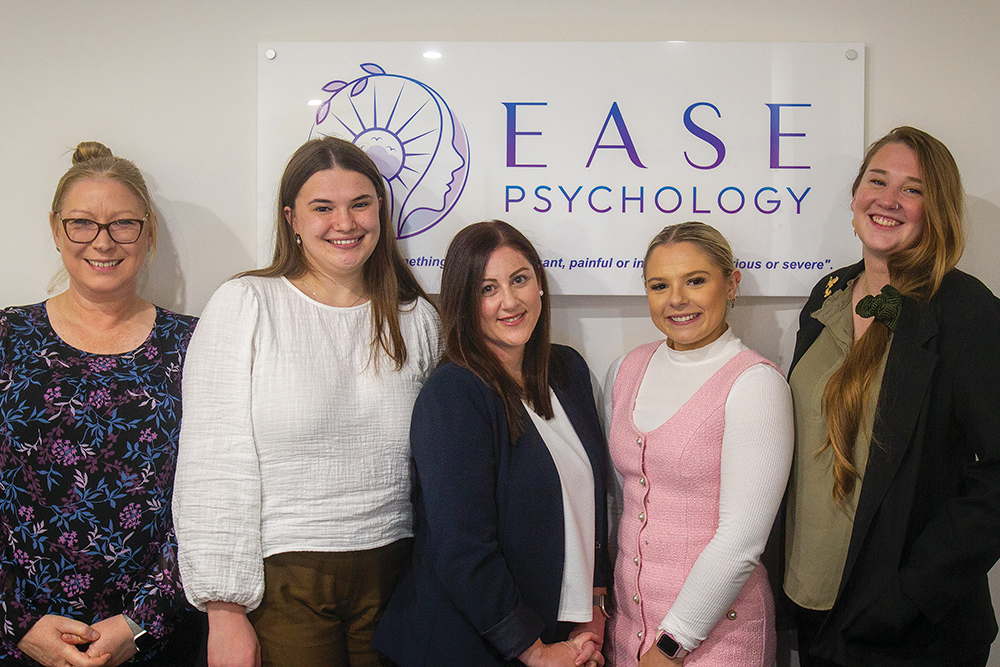
“We use an individualised approach to treatment planning and our psychologists have regular supervision to enhance best treatment outcomes for clients,” says clinical psychologist DANIELLE HOPKINS, of Ease Psychology.
There are three subtypes of attention deficit hyperactivity disorder (ADHD); predominantly inattentive, predominantly hyperactive/impulsive and combined type, says Danielle Hopkins, clinical psychologist at Ease Psychology.
ADHD has recently become more visible, which Danielle says has led to the incorrect assumption that it is being over diagnosed.
In reality, she says the profession is still catching up with the many adults who were not diagnosed as children.
In particular, there has been an increase in diagnoses for women, who often present differently, which led to a trend of underdiagnosis in the past.
There is also a focus on those who show more internalising symptoms, rather than overt hyperactivity and restlessness, she says.
This improved understanding of different ADHD presentations is similarly important for early intervention, which Danielle says helps to improve outcomes from a younger age.
“We often hear that adult ADHDers were called lazy, messy, spacey and alike during their younger years, not realising that impaired executive functioning was having a big impact on their ability to manage everyday tasks,” says Danielle.
“The earlier someone is diagnosed, the less they will have to mask over time and potentially develop a belief that there is [something] wrong with them.
“Earlier diagnosis can result in higher self-acceptance and self-compassion and better management of symptoms across the lifespan.
“Diagnosis can help with school-learning plans, accommodations and supports, as well as extra support at university and in the workplace.”
But, Danielle says there is, generally, a lack of available services in Canberra for cognitive assessments.
Fortunately, Ease Psychology has the capacity to undertake ADHD, learning disorder (such as dyslexia/dyscalculia), early entry into ACT primary school and developmental delay assessments, and Danielle says they will also have space for autism spectrum disorder assessments from September.
They also undertake individual psychological treatment for ADHD, ASD and other symptom presentations, such as depression and anxiety, life adjustment, trauma and relational issues.
“Comprehensive assessment at Ease [Psychology] involves psychometric testing, ADHD symptom reports by parents, self and teacher (or observer), objective measures of cognitive responses through continuous performance tests, educational assessment, and in-depth clinical interviews of symptoms and impairments,” she says.
“From an assessment, the useful thing is that you can start to see a pattern of symptoms, and you can know which ones are more severe or impairing, and they would be the ones that you’d target in treatment first, because they give the most relief.
“And then people can also seek out medication if they choose to, and that would be through a specialist prescriber.”
During school terms, Ease Psychology also runs a child and parent program called Emotion Explorers, which Danielle says aims to help children between seven and 12 years old to better regulate their emotions, and can suit children with ADHD or anxiety symptoms.
“Having a parent in the group to learn coping skills with their child results in better translation of skills into everyday practice as parents can remind and prompt their children,” Danielle says.
There is also an evidence-based group program on offer several times a year, The Brainstorm Program, which focuses on adult ADHD.
“The program is 10 weeks and is broken into two parts: the first is learning the evidence-based interventions and the second is applying those skills in practical ways to support improvement in ADHD symptoms,” she says.
Receiving a diagnosis can be a bit of a process, and Danielle says it is not unusual for people to feel unsettled after.
“The information can take time to become part of their identity and how they think about themselves,” she says.
“This is where psychological sessions can help, to support acceptance of a diagnosis, but also to then target the symptoms specific to their presentation.
“We use an individualised approach to treatment planning and our psychologists have regular supervision to enhance best treatment outcomes for clients.”
In order to ensure these services remain accessible to everyone, Danielle says Ease Psychology offers payment plans.
Also, Medicare will rebate up to 10 sessions a calendar year, for those with a valid Mental Health Care Plan from a GP, she says.
They also have a provisional psychologist practising under supervision, who attracts a lower fee, as they are nearing graduation and are not eligible for Medicare rebates, she says.
Ease Psychology, Ground Floor, 10 National Circuit, Barton. Call 0487 286505 or visit easepsychology.com.au
Who can be trusted?
In a world of spin and confusion, there’s never been a more important time to support independent journalism in Canberra.
If you trust our work online and want to enforce the power of independent voices, I invite you to make a small contribution.
Every dollar of support is invested back into our journalism to help keep citynews.com.au strong and free.
Thank you,
Ian Meikle, editor




Leave a Reply